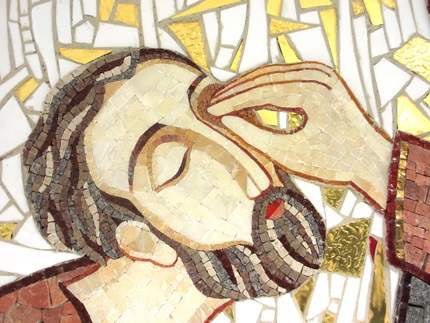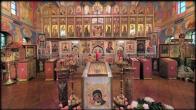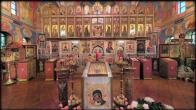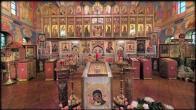You are here
Sunday of the Blind Man

METROPOLITAN TIKHON (SHEVKUNOV)
Christ is Risen!
Perhaps today’s story of the healing of the blind man is especially important for us, for our generation. When the Savior walked near the blind man—who was known throughout Jerusalem—but did not ask him anything, not even about his faith, he passed by him and healed him. The blind man became a man who sees. The Pharisees began interrogating him, asking him who worked this great good for him—something they themselves would never have been able to do.
They took the man to task, accusing the Savior of doing this great deed on God’s day—Saturday. Unable to find a single word to refute the Truth that shone brilliantly before them in this unprecedented miracle, the Pharisees where nevertheless unable to restrain themselves, and in their envy and wrath they blasphemed God and the Holy Spirit.
Some ask, “What is blasphemy against the Holy Spirit?” This terrible sin is described in today’s Gospel reading: the Pharisees see the power of God—manifested in the healing of the man blind from birth—but they nevertheless stubbornly deny that power. They say mockingly, Give God the praise: we know that this man is a sinner. But the healed man says, Now we know that God heareth not sinners: but if any man be a worshipper of God, and doeth his will, him he heareth. Since the world began was it not heard that any man opened the eyes of one that was born blind. If this man were not of God, he could do nothing. Then the Pharisees cast him out of the synagogue, and severed him from the society of the Israelites.
He was deprived of all rights. From that time on, according to Jewish law, no one could associate with him, help him, or live with him. His mother and father disowned him.
For my father and mother have forsaken me, but the Lord hath taken me to Himself (Ps. 26:12)… At that very moment the Savior Himself finds him and says to him, Dost thou believe on the Son of God? The one who had gained his sight asks, Who is he, Lord, that I might believe on him? The Savior then says to him something very similar to what He said to the Samaritan woman last week: Thou hast both seen him, and it is he that talketh with thee. The man blind who was born blind needed no other proof. He worshipped Him as God and said, Lord, I believe.
It is no coincidence that a week ago the Holy Church emphasized the Savior’s same revelation to a sinful but pure-hearted Samaritan woman. Both of these people in the Gospels saw God.
All of us are a generation of people born blind. We were born, for the most part, outside of faith in the Lord. According to an ancient plan, our spiritual eyes should have remained closed until our very death. And millions upon millions of people would have gone to eternity without knowing God, or their own souls, or even the spiritual world itself. Everything was done to ensure that we, born blind from parents who were to one or another extent born blind, would remain that way forever.
But God worked a miracle on us. Without asking us whether we believe or not, without tormenting us over this question, but to the contrary knowing that this faith was not in us, the Lord anointed us with clay and sorrows as with holy myrrh, and millions upon millions of people in our country were healed. Their spiritual eyes were opened.
Our contemporaries, blind people who were healed liked the man blind from birth, where subjected to difficult trials, interrogations, and mockery by the Pharisees of this age, and many of us were cut off from the society of our friends and relatives. What happened to the man blind from birth in the Gospels happened also to many of us.
But why did the Savior heal him in particular? Why was this miracle of God manifest in this particular person, and not in the whole crowd of people standing near him, who were just as misfortunate, injured, or sick? Two weeks ago we read in the Gospels how the Savior healed the paralytic. That man thirsted and hoped for healing over the course of thirty-eight years, but the man blind from birth did not even have faith, for he did not know who to believe in. He simply could not see the Lord; he did not see the One Who said to him, Go, wash in the pool of Siloam. The Savior revealed His Divinity to precisely this man, because He saw his courageous confession before the enemies of the Truth, the enemies of God.
Even so, why was one man healed, and no one else? Why did the Savior pass by the crowd of wretched, poor, crippled, and paralyzed, take one of them, and heal him? Why, out of the millions and billions of those born blind does only a little flock gain its sight spiritually? Why, out of hundreds of different nations living in the world, do only a few of them confess the saving Orthodox Faith?
Humanly speaking, it is not fair. Humanly speaking: What made the other blind men any worse than this one? And the other paralytics who lay by the pool of Siloam—what made them any worse than that paralytic who was healed? Why are you and me (and each of us knows our own worth: not so very high) any better than the millions of our brothers and sister in this world, who were not enlightened by the light of faith?
Even during the Savior’s earthly life, when He walked the earth, He chose out of many only those… whom He chose. The same thing is happening now. Even out of those nations all together, the Lord chooses only those whom He chooses.
So who, after all, are those whom the Savior chooses?
Before His sufferings, at the Last Supper, He said to His disciples, I have chosen you out of the world (Jn. 15:19). Later, in his High-Priestly prayer, He says to the Father, Holy Father, keep through thine own name those whom thou hast given me (Jn 17:11). Who are they? Wealthy and great people? Of course not. Only the poor? Again, wrong. Amongst God’s chosen were people of every economic class. Or perhaps they were people who were rich in something else—reason and wisdom? Nothing of the sort. There were wise people who recognized the feebleness of their minds, and there were people entirely unlearned, even holy fools, to whom extraordinary revelations were suddenly sent. Perhaps these were people rich in sins, because the Lord was sent to save sinners? But we know that all are sinful before God. Or maybe these were people rich in faith? Yes, the Lord required faith of people. But He healed the man blind from birth without the latter’s faith. He healed the man sick of the palsy, for whom the roof of the house was opened and broken up, and who was lowered down before Him (cf. Mk. 2:4), only because of the faith of those who had brought him. But we also know that the demons believe, and tremble… So who does the Lord choose for His inheritance?
The Apostle says in one of his epistles, nevertheless I live; yet not I, but Christ liveth in me(Gal. 2:20). These are the ones whom the Savior chooses: those who can deny themselves and become God’s dwelling.
By God’s unsearchable care for mankind, only such people are chosen, even though they may be faint-hearted like the paralytic, who betrayed the Savior two weeks ago. Even he could say, if only once in his life, “See—Christ lives in me.” He could have become God’s temple. Judas was also God’s temple at one time! But God will give over to corruption those who corrupt God’s temple…
I live; yet not I, but Christ liveth in me. Anyone who has been chosen by God can say the same. The “old man” is done away with, and Christ is born in him.
However, Christ lives in us in a way that is not at all mere speculation—not only in our minds. There are many believing Christians with Christ in their minds: Protestants, Catholics, and those who simply say, yes, I believe in Christ, but I do not belong to the Church. There are people who philosophize about Christ, who make dreamy assumptions about Him, and want to hear about Him; but the life of Christ is not in them. They are outside the Body of Christ, outside the Church of Christ. Therefore, it turns out that many peoples who have heard about Christ nevertheless live outside of His body, outside of His Divinity.
Of course, we speak of this not in order to feel proud. The Holy Church speaks of the chosen ones as God’s great mercy towards sinful people, but also as a great responsibility. Because the chosen, unfortunately, can also be like Judas; they can become apostates, in whom Christ once lived, but who later betray and crucify their Savior.
Our gaining of sight consists in our beginning to see ourselves as full of sins and capable of every evil and betrayal. Our gaining of sight consists in our seeing the world as it really is: lying in evil. Our gaining of sight consists in our beginning to see and appreciate in this world only God’s great mercy toward us and all of blind humankind. But if we do not see all of this, it means that we only think we that we see, but in fact we remain in our blindness—from which may the Lord deliver us!
Christ is Risen!
PARISH LIFE
RECENT VIDEOS
Address of our Cathedral
Subscribe to our mailing list
While all the materials on this site are copyrighted, you may use them freely as long as you treat them
with respect and provide attribution on the Russian Orthodox Cathedral of St.John the Baptist of Washington DC.









